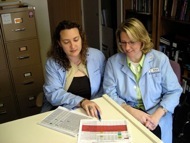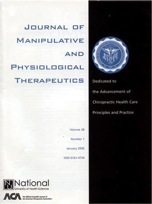The world of alternative and complementary medicine is full of treatment options, but will a popular therapy truly work for your particular patient’s needs? When your patients come to you for help, earn their trust and confidence by relying on solid evidence based practice principles.
 What is Evidence Based Practice (EBP)? EBP is a method of using the best available research evidence in combination with clinical expertise while respecting an individual patient’s needs and concerns. Students and physicians trained in evidence based practice, learn how to find and interpret research that will help them make clinical decisions that best fit a particular patient situation.
What is Evidence Based Practice (EBP)? EBP is a method of using the best available research evidence in combination with clinical expertise while respecting an individual patient’s needs and concerns. Students and physicians trained in evidence based practice, learn how to find and interpret research that will help them make clinical decisions that best fit a particular patient situation.
Evidence based practice starts and ends with the patient. The clinician determines what information is needed using their expertise, skills and knowledge. Patient expectations also factor into forming the question the physician decides to research.
When a clinical question necessitates a search for high quality evidence, the trained professional poses a “structured” clinical question to lead the search. The “PICO” format for a clinical question provides structure for an efficient literature search. PICO stand for Patient – Intervention – Comparison – Outcome. The skill to develop a “PICO-format” question is part of key training in evidence based practice.
The wealth of medical literature and research findings available today is immense and often daunting. Training in evidence based practice principles helps students and physicians know how to quickly zero in on the appropriate research and how to interpret it correctly.
“When you are starting your health care career, passion, enthusiasm and philosophy are great. However, the need for evidence based clinical decision making is growing stronger,” says Dr. Christopher Wolcott, graduate of National University of Health Sciences (NUHS) and instructor in the university’s evidence based practice curriculum.
NUHS has incorporated classes in evidence based practice throughout its curriculum as part of a grant received from the National Institutes of Health. In addition, the university’s Department of Research sponsors seminars, journal clubs and case-study presentations all geared to keep its faculty and students excited about integrating research and evidence based practice principles into their teaching and clinical care. Indeed, National has always insisted that techniques, adjustments and therapies taught in its degree programs have their basis in sound scientific principles backed by research.
NUHS has a history as a leader in research for the chiropractic profession and is expanding its research role into other  integrative medical applications. NUHS also publishes three scientific journals for the chiropractic profession including the Journal of Manipulative and Physiological Therapeutics, the only refereed, internationally indexed chiropractic scientific journal. JMPT was also selected as the official research publication of the American Chiropractic Association.
integrative medical applications. NUHS also publishes three scientific journals for the chiropractic profession including the Journal of Manipulative and Physiological Therapeutics, the only refereed, internationally indexed chiropractic scientific journal. JMPT was also selected as the official research publication of the American Chiropractic Association.
National’s research department has received several grants from funding sources such as the National Institutes of Health – National Center for Complementary and Alternative Medicine, the Department of Health and Human Services, as well as the Foundation for Chiropractic Education and Research (FCER).




0 Comments